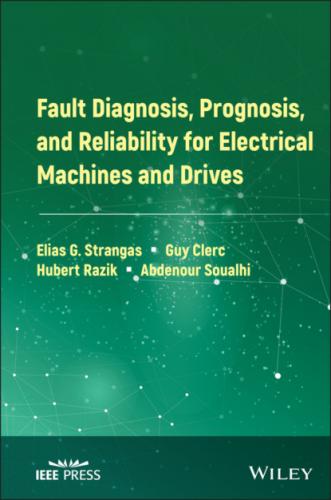Fault Diagnosis, Prognosis, and Reliability for Electrical Machines and Drives
Elias G. Strangas
Michigan State UniversityEast Lansing, Michigan
Guy Clerc
University of LyonVilleurbanne, France
Hubert Razik
University of LyonVilleurbanne, France
Abdenour Soualhi
University of LyonSaint Etienne, France
This edition first published 2022
© 2022 by The Institute of Electrical and Electronics Engineers, Inc. All rights reserved.
Edition History
Published by John Wiley & Sons, Inc., Hoboken, New Jersey.
Published simultaneously in Canada
No part of this publication may be reproduced, stored in a retrieval system, or transmitted in any form or by any means, electronic, mechanical, photocopying, recording, scanning, or otherwise, except as permitted under Section 107 or 108 of the 1976 United States Copyright Act, without either the prior written permission of the Publisher, or authorization through payment of the appropriate per-copy fee to the Copyright Clearance Center, Inc., 222 Rosewood Drive, Danvers, MA 01923, (978) 750-8400, fax (978) 750-4470, or on the web at www.copyright.com. Requests to the Publisher for permission should be addressed to the Permissions Department, John Wiley & Sons, Inc., 111 River Street, Hoboken, NJ 07030, (201) 748-6011, fax (201) 748-6008, or online at http://www.wiley.com/go/permission.
Limit of Liability/Disclaimer ofWarranty: While the publisher and author have used their best efforts in preparing this book, they make no representations or warranties with respect to the accuracy or completeness of the contents of this book and specifically disclaim any implied warranties of merchantability or fitness for a particular purpose. No warranty may be created or extended by sales representatives or written sales materials. The advice and strategies contained herein may not be suitable for your situation. You should consult with a professional where appropriate. Neither the publisher nor author shall be liable for any loss of profit or any other commercial damages, including but not limited to special, incidental, consequential, or other damages.
For general information on our other products and services or for technical support, please contact our Customer Care Department within the United States at (800) 762-2974, outside the United States at (317) 572-3993 or fax (317) 572-4002.
Wiley also publishes its books in a variety of electronic formats. Some content that appears in print may not be available in electronic formats. For more information about Wiley products, visit our web site at www.wiley.com.
Library of Congress Cataloging-in-Publication Data
A catalogue record for this book is available from the Library of Congress
Hardback ISBN: 9781119722755; ePub ISBN: 9781119722786; ePDF ISBN: 9781119722809;
oBook ISBN: 9781119722823.
Cover image: © Sandipkumar Patel/Getty
Cover design by Wiley
Set in 9.5/12.5pt STIXTwoText by Integra Software Services Pvt. Ltd, Pondicherry, India
From the authors to their families
Contents
1 Cover
7 Acronyms
9 1 Basic Methods and Tools1.1 General Approach1.2 Feature Extraction: Signal and Preconditioning1.2.1 Raw Signals: What Kind of Signals and Sensors?1.2.1.1 Current Sensors1.2.1.2 Vibration Measurement and Accelerometers1.2.1.3 Temperature Sensors1.2.1.4 Field Sensors1.2.1.5 Acoustic Sensors1.2.1.6 Other Sensors1.2.2 Preconditioning1.2.2.1 Signal Features in the Time Domain1.2.2.2 Symmetric Component, Park Component1.2.2.3 Symmetric Component, Park Component1.2.2.4 Signal Features in the Frequency Domain1.2.2.5 Wavelet Analysis1.2.2.6 Instantaneous Amplitude and Frequency1.2.2.7 Bilinear Time–frequency Distributions or Quadratic Time–frequency Distributions: Cohen’s Class1.2.2.7.a Uncertainty Principle of Heisenberg1.2.2.7.b General Representation1.2.2.7.c Properties1.2.2.7.d Different Representations1.2.2.8 Statistic Features1.2.2.9 Cyclostationarity1.2.3 Model Approach1.2.3.1 Kalman Observer1.2.3.2 Extended Observer1.2.3.3 Unscented Kalman Filter1.2.4 Parity Space1.3 Feature Reduction, Principal Component Analysis1.3.1 Principal Component Analysis: A Space Reduction and an Unsupervised Classification1.3.2 Intercorrelation1.3.2.1 Pearson Coefficient “r”1.3.2.2 Spearman Coefficient “ b ”1.3.3 Information Content: Shannon Entropy1.3.4 Pattern Sizing Reduction for a Supervised Classification1.3.4.1 Selection Criteria1.3.4.2 Sequential Backward Feature Selection and Sequential Forward Feature Selection1.3.5 Pattern Sizing Reduction for an Unsupervised Classification: Laplacian Score1.3.6 Choice of the Number of Classes for an Unsupervised Classification1.3.6.1 Choice of the Number of Classes with a PCA1.3.6.2 General Case1.3.7 Other Quality Criteria of a Classification1.3.7.1 R2 index1.3.7.2 Calinski–Harabasz Index1.3.7.3 Davies–Bouldin Index1.3.7.4 Silhouette Index1.3.7.5 Dunn Index1.4 Classification Methods1.4.1 Generalities1.4.1.1 Supervised and Unsupervised Clustering1.4.1.2 Measuring the Similarity: Different Distances1.4.2 Supervised Clustering1.4.2.1 k Nearest Neighbors1.4.2.2 Support Vector Machine1.4.2.3 Recurrent Neural Network1.4.3 Unsupervised Clustering1.4.3.1 Hierarchical Classification1.4.3.2 K-means and Centroid Clustering1.4.3.3 Self-organizing Map1.5 Prognosis Methods1.5.1 Prognosis Process1.5.2 Time Series Extrapolation Methods1.5.3 Bayesian Inference1.5.4 Markov Chain1.5.5 Hidden Markov Models1.5.6 Rainflow1.5.6.1 Hidden Semi-Markov ModelsReferences
10 2 Applications and Specifics2.1 General Presentation of Motor Drives2.2 Electrical Machines2.2.1 Basics2.2.2 Magnetic Steel and Magnets2.2.3 Windings and Insulation2.3 Machine Models, Operation, and Control2.3.1 Three-phase Windings2.3.2 Induction Machines2.3.2.1 Induction Machine Rotor Field Orientation2.3.2.2 Direct Torque Control2.3.3 Permanent Magnet AC Machines2.4 Faults in Electrical Machines2.4.1 Operational Variables and Measurements2.4.2 Supervision, Detection, and Fault Classification2.4.3 Bearings2.4.4 Insulation2.5 Open and Short Faults, Eccentricity, Broken Magnets and Rotor Bars2.5.1 Induction Machines2.5.1.1 Stator Fault Diagnosis2.5.1.2 Eccentricity2.5.1.3
